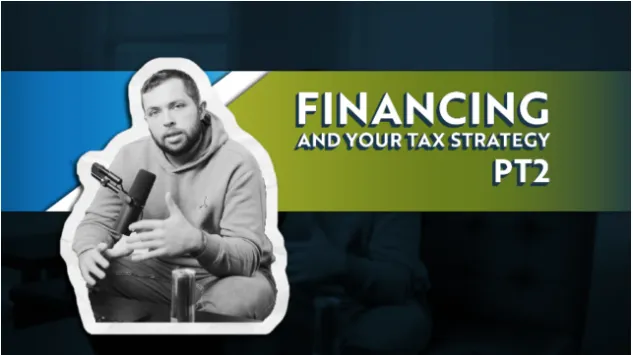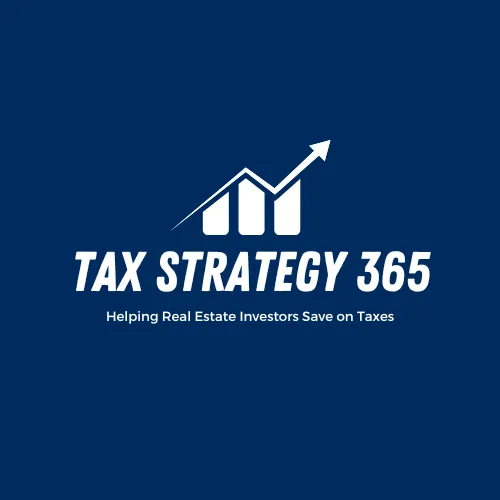Latest blogs and articles
Leading you to a better financial future.

Financing and Your Tax Strategy Part 2
Financing and Your Tax Strategy, Part 2
Financing and tax strategy should go hand in hand. These two have cause and effect relationships with each other and it is important to consider them both when making decisions. In this week's part 2 podcast we cover the importance of being bankable as well as creating lender friendly tax returns. If you missed part one, listen to that first and come back here for the sequel.
One aspect of real estate investing that often gets overlooked is being "bankable." But what does that really mean? Essentially, it's about your ability to secure financing. Leveraging money through loans is crucial for real estate investors to build wealth, and not being able to secure financing can be a major obstacle.
For many, qualifying for a loan is straightforward if you have a W2 job. This applies to the majority of tax filers and makes the loan process much smoother compared to being self-employed. Additionally, couples can each have up to 10 conventional loans, but the biggest challenge often comes down to managing your debt-to-income ratio (DTI). One strategy to tackle this is by including rental income in your DTI calculations, sometimes even considering future rental income from properties you intend to purchase.
But what about if you're self-employed? Well, it's a bit trickier. Banks usually want to see at least two years of profitable history for self-employed borrowers, which could mean waiting around three and a half years before you're eligible for a loan. Your tax strategy plays a significant role here too. Taking too many deductions in your early years of self-employment can backfire when it comes to borrowing since banks won't add back deductions the same way they do for rental property depreciation.
Balancing taxable income reduction with lender-friendly tax returns is key, and resources like LearnLikeaCPA offer valuable insights into tax planning and financing. It's crucial to understand how tax, lending, and legal aspects intertwine to make informed decisions.
Lastly, let's talk about DSCR (Debt Service Coverage Ratio) loans. While they can be an option, relying solely on them isn't advisable. These loans tie up liquidity and can increase risk, especially if the market shifts. Consider buying prepayment penalties upfront if you opt for DSCR loans to avoid potential pitfalls.
In summary, navigating tax strategy and financing in real estate investing requires careful consideration of all available options to make the best decisions for your financial goals.
Financing and Your Tax Strategy Part 2
Join my Facebook group with over 9,000 real estate investors!

Choose Your Journey to Tax Excellence
Journey 1
Building a Tax Advisory & Consulting Practice
Scale, streamline, and systemize your advisory business.
Turn compliance clients into year-round advisory opportunities while mastering operational efficiencies for sustainable growth. This track covers pricing, hiring, marketing, and client engagement essentials to help you build a practice you love.
WHAT YOU’LL LEARN:
Crafting solid engagement letters and pricing models.
Transforming compliance clients into year-round
partners.
Marketing
strategies that drive consistent growth.
Recruiting and training the right team to scale your business.
Bonus:A Power Checklist for the ultimate year-end tax planning session.
Journey 2
Tax and Legal Foundations: Core Strategies for All Levels
Master the fundamentals that drive financial success.
Perfect for business owners and advisors, this track delivers essential insights on asset protection, tax planning, estate strategies, and IRS compliance.
WHAT YOU’LL LEARN:
Unlock estate planning with Revocable Living Trusts.
Maximize retirement savings through Solo 401(k) plans.
Real estate strategies: Short-term, long-term, and self-rentals.
Learn asset protection that actually works.
Navigate IRS resolution with confidence and ease.
Journey 3
Advanced Insights: Unlock Complex Tax Strategies
Top-tier strategies for high-value clients.
Designed for experienced professionals, this track offers in-depth guidance on prime tax strategies, entity structuring, and payroll solutions. Gain the insights needed to handle complex business scenarios with confidence.
WHAT YOU’LL LEARN:
Report multi-entity structures with Forms 1065 & 1120S.
Maximize tax savings using Bonus Depreciation & Section 179.
Seamlessly relocate clients to tax-free states.
Navigate business sales and acquisitions smoothly.
Use 105 Plans to save clients on healthcare costs.

2024 Learn Like A CPA. All rights reserved.